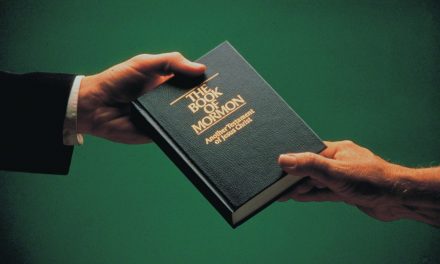Members of The Church of Jesus Christ of Latter-day Saints—sometimes inadvertently called the Mormon Church—believe in following the Savior, Jesus Christ, in all things. When Christ walked on the earth, He was mocked, scorned, reviled, belittled, beaten, and yet answered His accusers and tormentors with silence or the words of His Father. He taught His followers to “turn the other cheek” (Matthew 5:39) and to “love your enemies, bless them that curse you, do good to them that hate you, pray for them which despitefully use you, and persecute you” (Matthew 5:44). When you engage another person contentiously, you lose the power of the Holy Spirit and, in effect, can have little influence toward a positive outcome.
The Church of Jesus Christ has been faced in recent years with mocking, disrespectful and offensive attention from some Hollywood producers and their productions. Church leaders did not retaliate, boycott or make a fuss. Instead, they responded as the Savior did, and encouraged members to do the same—by not engaging in contentious conversations and conducting themselves with dignity and thoughtfulness when in the public arena [1].
Certainly Church members are offended when their most sacred practices are misrepresented or presented without context or understanding…. The Church of Jesus Christ of Latter-day Saints as an institution does not call for boycotts. Such a step would simply generate the kind of controversy that the media loves. … If the Church allowed critics and opponents to choose the ground on which its battles are fought, it would risk being distracted from the focus and mission it has pursued successfully for nearly 180 years. Instead, the Church itself will determine its own course as it continues to preach the restored gospel of Jesus Christ throughout the world. [1]
Responding with Christian Courage
Elder Robert D. Hales, a member of the Quorum of the Twelve Apostles (a governing body of The Church of Jesus Christ), answered this question from a young member: “Why doesn’t the Church defend itself more actively when accusations are made against it?” He responded:
I would say that one of mortality’s great tests comes when our beliefs are questioned or criticized. In such moments, we may want to respond aggressively—to ‘put up our dukes.’ But these are important opportunities to step back, pray, and follow the Savior’s example. …When we respond to our accusers as the Savior did, we not only become more Christlike, we invite others to feel His love and follow Him as well.
To respond in a Christlike way cannot be scripted or based on a formula. The Savior responded differently in every situation. When He was confronted by wicked King Herod, He remained silent. When He stood before Pilate, He bore a simple and powerful testimony of His divinity and purpose. Facing the moneychangers who were defiling the temple, He exercised His divine responsibility to preserve and protect that which was sacred. Lifted up upon a cross, He uttered the incomparable Christian response: ‘Father, forgive them; for they know not what they do’ (Luke 23:34).
Some people mistakenly think responses such as silence, meekness, forgiveness, and bearing humble testimony are passive or weak. But to ‘love [our] enemies, bless them that curse [us], do good to them that hate [us], and pray for them which despitefully use [us], and persecute [us]’ (Matthew 5:44) takes faith, strength, and, most of all, Christian courage. [2]
Opposition Brings Opportunities
The Church has determined that staying focused on what is important—that is, preaching the gospel of Jesus Christ to the world—will gain far greater ground. Elder Hales said:
Through the years we learn that challenges to our faith are not new, and they aren’t likely to disappear soon. But true disciples of Christ see opportunity in the midst of opposition. …Experience shows that seasons of negative publicity about the Church can help accomplish the Lord’s purposes. In 1983 the First Presidency wrote to Church leaders, ‘Opposition may be in itself an opportunity. Among the continuing challenges faced by our missionaries is a lack of interest in religious matters and in our message. These criticisms create … interest in the Church. … This provides an opportunity [for members] to present the truth to those whose attention is thus directed toward us.’ [2]
An example of this has occurred with the “Book of Mormon” musical, which was written by the creators of “SouthPark” and mocks much of what The Church of Jesus Christ  holds sacred. Boston resident Liza Morong’s parents took her to see the musical in New York City in September of 2011. The 21-year-old musical theater major said she laughed during the entire show and thought, “These people are crazy. They must be brainwashed.” But she was also curious about the religion, and found herself on Mormon.org—intending to “continue her amusement.” She found a live chat with missionaries and starting chatting with Elder Trevor Boardman, a missionary in the referral center at the MissionaryTrainingCenter in Provo, Utah. [3]
holds sacred. Boston resident Liza Morong’s parents took her to see the musical in New York City in September of 2011. The 21-year-old musical theater major said she laughed during the entire show and thought, “These people are crazy. They must be brainwashed.” But she was also curious about the religion, and found herself on Mormon.org—intending to “continue her amusement.” She found a live chat with missionaries and starting chatting with Elder Trevor Boardman, a missionary in the referral center at the MissionaryTrainingCenter in Provo, Utah. [3]
“I thought, ‘These clowns are in for a treat with me,’” Morong said. “But (Elder Boardman) was so incredibly nice. I could not be mean to him.” His genuine kindness caught Morong off guard. So instead of harassing him, she asked sincere questions she had after seeing the musical. Eventually, Morong was taught the gospel of Jesus Christ, read the Book of Mormon and decided to be baptized a member of The Church of Jesus Christ of Latter-day Saints. [3]
Richard Marcus, a California resident and former mayor of Culver City, California, had been doing research and asking questions about The Church of Jesus Christ when a friend invited him to see the “Book of Mormon” musical. “I was looking for anything I could. I knew it was a goof, a spoof, a satire, but I thought, ‘I don’t have anything. Maybe I should check that out,’” he said. After seeing the show, Marcus said, “I wanted even more to find out what this was all about.” He tried to buy a copy of the Book of Mormon at the theater’s souvenir counter but was disappointed to find out it was a copy of the musical’s script. He eventually met with the missionaries, received a copy of the real Book of Mormon and decided to be baptized a member of The Church of Jesus Christ. [4]
When members of The Church of Jesus Christ of Latter-day Saints respond to their accusers and mockers as the Savior did, miracles can happen—just as they did when Jesus Christ walked on the earth.
Elder Hales said:
When we do not retaliate—when we turn the other cheek and resist feelings of anger—we … stand with the Savior. We show forth His love, which is the only power that can subdue the adversary and answer our accusers without accusing them in return. That is not weakness. That is Christian courage. [2]






Recent Comments